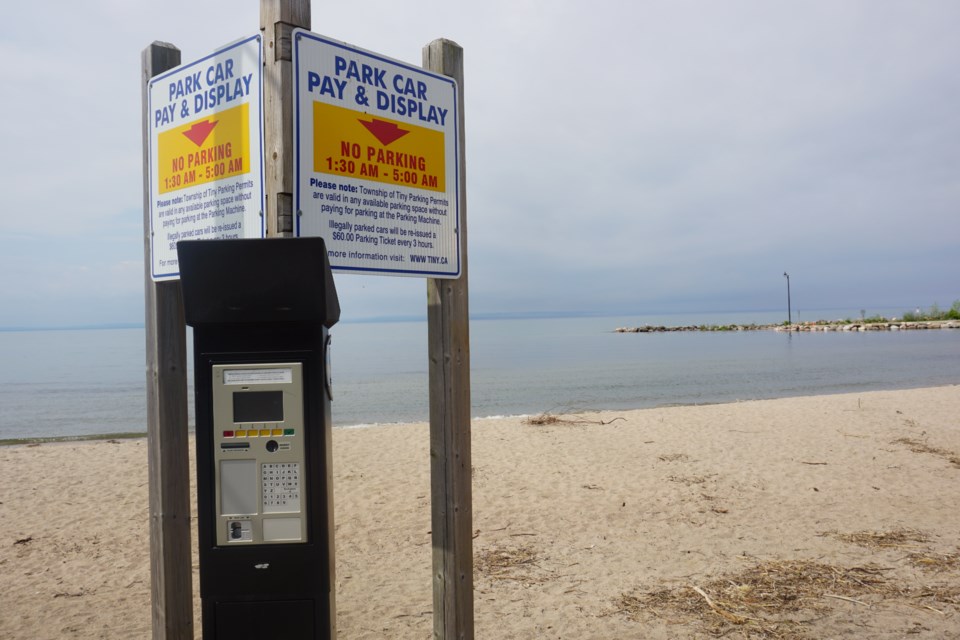Paid parking permits for non-residents to Tiny beaches was back on the schedule at a recent council meeting.
A discussion centring around the use of a digital platform to purchase non-resident parking permits was the topic during a set of recommendations from Tiny staff in anticipation of April 15 when permit parking begins.
In 2021, Tiny Township responded to pandemic measures by temporarily changing pay parking to permit parking. Non-resident parking permits were increased to 225 last year, up from 175 permits in 2019 and 2020; that increase caused conflict when registrations on the purchase deadline resulted in a lottery for the overflow.
Chief municipal law enforcement officer Steve Harvey presented a report to council at a recent meeting, providing several options for the township to consider in exploring how to best serve non-residents parking permits.
Council had previously directed staff to look into potential daily permits for non-residents as a cheaper option to the proposed 2022 criteria for a six-month permit costing $100 each. In discussions with digital app provider HotSpot Technologies, Harvey confirmed that a daily permit option could be implemented.
“Through their system,” Harvey explained, “they have an annual reoccurring cost of $10,000 per year for the program and app, and a $1 per permit for customer verifications to ensure that the people getting these permits actually reside in these municipalities that would apply.
“In order to recover the ($22,500) in revenue that we’d seen last year from non-resident permits and the additional cost, we’d need to generate about $35,000 to be revenue-neutral for 2022.
“This is somewhat introducing a hybrid pay parking system to the end of our concession roads in a certain way. Currently, either residents or non-residents can get the pass, or a non-resident can use the pay and display parking that’s currently available at our four beach parks with master plans,” Harvey noted.
After a long conversation on the matter, council opted for the daily non-resident permit program through mobile HotSpot Parking app recommendation, directing staff to research the inclusion of existing six-month, non-resident permits into the program in consultation with the digital platform provider.
CAO Robert Lamb raised caution to the offering of daily non-resident passes as an option if available parking could not be guaranteed on that given day.
“Part of the challenge with the daily solution, even though it’s a good idea, is if somebody goes online to buy one of those 100 or whatever the number is available for the day, and then cannot find a parking spot anywhere, what do they do?” asked Lamb. “If you haven’t made them available, then you’re actually misrepresenting your ability to provide that service by selling a daily permit.”
Lamb described how difficult it was for Tiny residents to find a parking spot in those locations at the best of times, and presented a hypothetical worst-case scenario for any non-resident pre-purchasing a daily parking permit.
“If I’ve gone online at seven o’clock in the morning and bought a permit, and I drive the entire municipality and can’t find a place to park, I’m going to be a little upset,” said Lamb. “Because most of the daily permits are premised on: you’ve pulled into a parking spot, and then bought it.
“So you may have to have the proper warnings in place saying, ‘do not purchase your daily parking spot until you’ve actually found one’, and ‘it’s a too-bad-so-sad if you did it the other way around.' That daily pass provides an expectation that there is going to be a parking spot for them to be able to park in.”
The next committee of the whole meeting for Tiny council is scheduled for March 15, where it is anticipated a separate report will be provided regarding a mobile payment solution aimed at enhancing pay and display paid parking in the township.
Non-resident parking permit criteria for 2022 currently includes:
* Only available to Residents of the Township of Tay, Springwater and Towns of Midland and Penetanguishene;
* Only allowed 1 permit per household (new in 2019);
* The permit is issued to 1 household for the 6 month season (April 15 – Oct 15);
* Must have Licence Plate for vehicle inscribed on permit;
* Not valid in NO PARKING areas or private roads;
* Apply by mail or in person (Not online or by phone);
* Are able to be used at all concession ends and Pay Parking locations;
* Typically available April 1st each year;
* Limit of 225 permits to be issued;
* Cost is $100/ permit.
Full details of the new program will be released before the 2022 permit parking season commences on April 15th. Information on parking in Tiny Township can be found on the parking page of the township website.
The non-resident parking permit program report, the 2022 criteria, and HotSpot mobile app overview can be viewed within the agenda page located on the Tiny Township website.
Archives of council meetings are available to view on Tiny Township’s YouTube channel.
